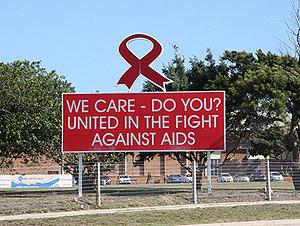New beginning in South Africa’s AIDS battle
Sign in the grounds of Nelson Mandela Metropolitan University (NMMU) (Image by Flickr user Brian Snelson (CC: by-nc-sa))
Story by Jason Margolis, PRI’s “The World”
December 1 was World AIDS day. Politicians in many countries held photo-ops and gave speeches that sounded good but largely went unnoticed. Yet in one country, remarks by the nation’s leader were closely watched.
South Africa is home to the largest number of HIV infected people in the world, and that nation has been widely criticized for a feeble public health response that has caused thousands of unnecessary deaths. On his first World AIDS day since taking office, South African President Jacob Zuma suggested a new era has begun for his nation and its fight against HIV.
Jacob Zuma is an unlikely champion of AIDS prevention and treatment. In 2006, he was accused and acquitted of raping an HIV positive woman. At the trial, where Zuma claimed that sex was consensual, he said he had protected himself from HIV by taking a shower afterwards. That remark exposed a fundamental misunderstanding of the disease and caused him to be ridiculed by public health experts.
On World AIDS Day, Zuma looked to change his image.
“Let the politicians, all the politicization and the endless debates about HIV and AIDS stop,” said Zuma as he announced aggressive new steps for fighting HIV in South Africa.
He said anti-retroviral drugs will be made more readily available to pregnant women and there would be a new push to offer better treatments to people infected with both HIV and Tuberculosis.
And he announced universal treatment for children with HIV: “All children under one year of age will get treatment if they test positive.”
Zuma urged all South Africans to be tested for HIV and he compared the fight against AIDS to the long struggle against apartheid.
“This is just a remarkable shift in presidential leadership in South Africa,” said Paul Zeitz, executive director of the Global AIDS Alliance.
He says Zuma’s speech represents an important turning point. “You have to change the mindset. You have to change the culture. You have to de-stigmatize the disease. He can bring this into a popular cultural movement which he launched today.”
For close to a decade, South Africans received a very different message about AIDS from then-President, Thabo Mbeki. Mbeki argued that HIV did not cause AIDS and his health minister was ridiculed for recommending garlic and beet root as treatments.
Dr. Pride Chigwedere has studied the harm cost to South Africa by those policies. He did his work while at the Harvard School of Public Health.
“We estimated that approximately 330,000 people died prematurely as a result of the policies that we implemented by the South African government from 2000 to 2005,” said Chigwedere.
According to Chigwedere, for many years South Africans were denied access to anti-retroviral drugs, even when pharmaceutical companies gave the drugs for pregnant women to take to prevent transmitting the virus to their children.
“And the minister of Health responded by instituting restrictions when the use of the drug or the drug was donated free of charge and they restricted the use,” he said.
Those days in South Africa now appear to be over.
Paul Zeitz of the Global AIDS Alliance says even before today’s speech, Zuma had made important changes.
“He has appointed a new minister of health who has totally revamped the National AIDS response,” said Zeitz. “He has gotten the support of the U.S. government through the PEPFAR initiative, the emergency plan for AIDS relief. They’ve announced a hundred and twenty million dollar donation today as well. He has the UN system there. This is a true national mobilization.”
Zuma will have his work cut out for him. Each day roughly a thousand people still die from AIDS related illnesses in South Africa.
PRI’s “The World” is a one-hour, weekday radio news magazine offering a mix of news, features, interviews, and music from around the globe. “The World” is a co-production of the BBC World Service, PRI and WGBH Boston.
